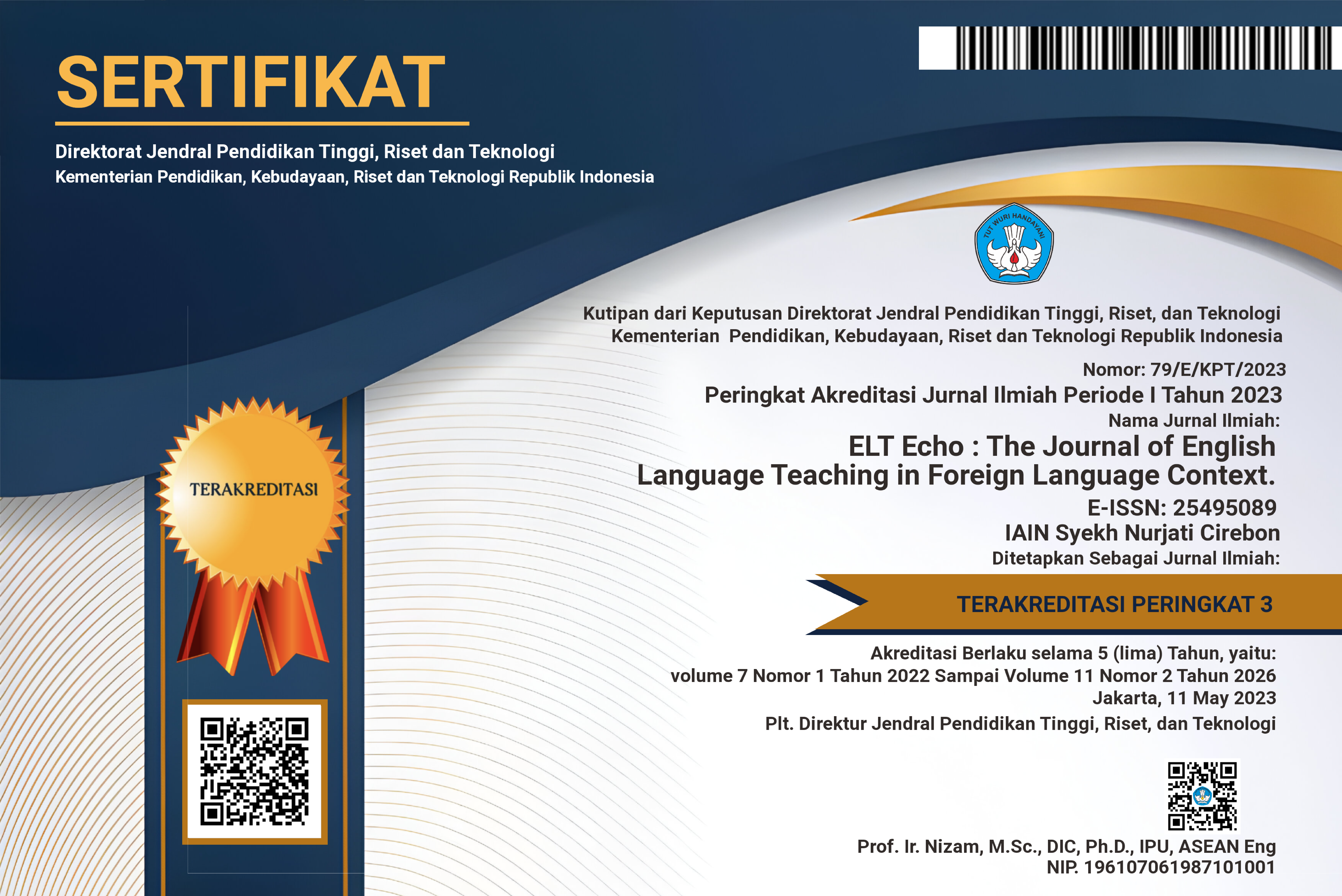Exploring the Dimensions of Intercultural Communicative Competence (ICC) in English Learning: Insights from EFL Students
(1)
(2)
(*) Corresponding Author
Abstract
Keywords
Full Text:
PDFReferences
Afzal, N. (2019). A Study on Vocabulary-Learning Problems Encountered by BA English Majors at the University Level of Education. Arab World English Journal, 10(3), 81–98. https://doi.org/10.24093/awej/vol10no3.6
Bennett, M. (1998). Intercultural communication: A current perspective. Basic Concepts of Intercultural Communication: Selected Readings, January, 1–20. http://www.mairstudents.info/6b.Bennett.pdf
Bojovic, M. (2010). Reading Skills and Reading Comprehension in English for Specific Purposes. The International Language Conference on The Importance of Learning Professional Foreign Languages for Communication between Cultures 2010, 1(September), 1–5. https://www.researchgate.net/profile/Milevica-Bojovic/publication/261213403_Reading_Skills_and_Reading_Comprehension_in_English_for_Specific_Purposes/links/0f317533960f7f422f000000/Reading-Skills-and-Reading-Comprehension-in-English-for-Specific-Purposes.
Byram, M. (2021). Teaching and Assessing Intercultural Communicative Competence. Multilingual Matters. https://doi.org/10.21832/9781800410251
Cavalheiro, L. (2015). Developing intercultural communicative competence in ELF communication. ELOPE: English Language Overseas Perspectives and Enquiries, 12(1), 49–60. https://doi.org/10.4312/elope.12.1.49-60
Chaouche, M. (2017). Incorporating Intercultural Communicative Competence in EFL Classes. SSRN Electronic Journal, December, 43–56. https://doi.org/10.2139/ssrn.2895538
Creswell, J. W. (2014). Research Design: Quantitative, Qualitative, and Mixed Methods Approaches (Fourth). Sage Publication.
Edi. (2022). The implementation of English learning based on model of Intercultural Communicative Competence (ICC) for improving students’ communication independence. English Review: Journal of English Education, 10(3), 1069–1076. https://doi.org/http://doi.org/10.25134/erjee.v10i3.6523
Effendi, M. S., Rokhyati, U., Rachman, U. A.-M., Rakhmawati, A. D., & Pertiwi, D. (2017). A Study on Grammar Teaching at an English Education Department in an EFL Context. International Journal on Studies in English Language and Literature, 5(1). https://doi.org/10.20431/2347-3134.0501005
Ella Yuzar, R., & Rahman, F. (2022). “Am I being Rudeâ€: Exploring Indonesian Students’ Intercultural Communicative Competence in Inner Circle Countries. Lingual: Journal of Language & Culture, 13(1), 18–27.
Galante, A. (2015). Intercultural Communicative Competence in English Language Teaching: Towards Validation of Student Identity. BELT – Brazilian English Language Teaching Journal, 6(1), 29. https://doi.org/10.15448/2178-3640.2015.1.20188
Gay, L. R., Mills, G. E., & Airasian, P. W. (2012). Educational Research: Competencies for Analysis and Application (10th Edition). Pearson Education.
Gilakjani, A. P., & Sabouri, N. B. (2016). The Significance of Listening Comprehension in English Language Teaching. Theory and Practice in Language Studies, 6(8), 1670. https://doi.org/10.17507/tpls.0608.22
Gudykunst, W. B. (2003). Cross-Cultural and Intercultural Communication. Sage Publication.
Issoulah, F. Z. (2022). Intercultural Communicative Competence in ELT. Global Scientific Journals, 10(8).
Lee, J., & Heinz, M. (2016). English Language Learning Strategies Reported By Advanced Language Learners. 12(2), 67–76.
Leong, L.-M., & Ahmadi, S. M. (2017). An Analysis of Factors Influencing Learners’ English Speaking Skill. International Journal of Research in English Education, 2(1), 34–41. http://ijreeonline.com/files/site1/user_files_68bcd6/sma1357-A-10-26-1-fefa0eb.pdf
Lughu, M. (2022). The Analysis of American and British English’s Vocabularies. Journal of English Language Teaching, Linguistics, and Literature Studies, 2(2), 273–285. https://doi.org/10.30984/jeltis.v2i2.1856
Lysiuchenko, O., Sydorenko, Y., Oleksiienko, L., Lysenko, T., & Hulych, M. (2021). Intercultural communicative competence in the development of students’ linguistic skills. Linguistics and Culture Review, 5(S4), 1202–1226. https://doi.org/10.21744/lingcure.v5ns4.1741
Martynova, M. (2021). The Role of Intercultural Competence in Teaching a Foreign Language. Scientific Research and Development. Modern Communication Studies, 10(6), 67–70. https://doi.org/10.12737/2587-9103-2021-10-6-67-70
Miles, M. B., Huberman, A. M., & Saldana, J. (2014). Qualitative Data Analysis: A Methods Sourcebooks (Third). Sage Publication.
Sandra, J., Sari, M. P., Poernomo, B., Premchaiporn, N., & Flores, M. E. A. (2023). Role of Intercultural Communicative Competence ( ICC ) to Improve the Quality of English Language Lecturers in the Digital Era. Budapest International Research and Critics Institute-Journal (BIRCI-Journal), 6(1). https://doi.org/https://doi.org/10.33258/birci.v6i1.7519
Santana, A. M., & Cely Betancourt, B. L. (2021). The importance of intercultural communicative competences in English classes on the context of current migration waves. Paradigmas Socio-HumanÃsticos, 3(1), 61–72. https://doi.org/10.26752/revistaparadigmassh.v3i1.519
Saraswati, G. P. D. (2017). Intercultural Communicative Competence (ICC) in Teaching Speaking Material Used in English Department of Universitas Negeri Semarang. Language Circle: Journal of Language and Literature, 11(2).
Shobikah, N. (2020). Competences in English. Journal of Research on English and Language Learning (J-REaLL), 1(1), 23. https://doi.org/10.33474/j-reall.v1i1.5280
Smakova, K., & Paulsrud, B. (2020). Intercultural communicative competence in english language teaching in Kazakhstan. Issues in Educational Research, 30(2), 691–708.
Styaningrum, E. D. (2019). The Effects Of Grammar Mastery And Vocabulary Mastery Towards Student’s Reading Comprehension In Expository Text. Wanastra: Jurnal Bahasa Dan Sastra, 11(1), 89–100. https://doi.org/10.31294/w.v11i1.5266
Syaputri, W., Theresia, F., & Yuniarti, F. (2021a). Cultural Understanding In English Language Learning. SIGEH ELT : Journal of Literature and Linguistics, 1(1), 27–34. https://doi.org/10.36929/sigeh 20elt.v1i1.354
Syaputri, W., Theresia, F., & Yuniarti, F. (2021b). Cultural Understanding In English Language Learning. SIGEH ELT : Journal of Literature and Linguistics, 1(1), 27–34. https://doi.org/10.36269/sigeh.v1i1.354
Tambunan, A. R. S., Lubis, F. K., Andayani, W., & Sari, W. S. (2021). Intercultural Communicative Competence Levels of Indonesian EFL Students: A Preliminary Study in a Higher Education Contex. Langkawi: Journal of The Association for Arabic and English, 7(2). https://doi.org/10.31332/lkw.v7i2.2870
Thongprayoon, T., Wangphasit, L., Yamrung, R., & Langka, W. (2020). Intercultural Communicative Language Learning Competencies of Undergraduate Students in an International Program in Thailand. THAITESOL Journal, 33(2), 1–19. http://ezproxy.msu.edu/login?url=https://search.ebscohost.com/login.aspx?direct=true&db=eric&AN=EJ1288387&site=ehost-live&scope=site
Uluşan, A. R. (2017). English for Specific Purposes: A Supplementary to Richard and Rodger’s" Approaches and Methods in Language Teaching ". Başkent University Journal of Education, 4(1), 50–60.
Yu, T., & Chen, G.-M. (2008). Intercultural Sensitivity and Conflict Management Styles in Cross-Cultural Organizational Situations. Intercultural Communication Studies, XVII(2), 149–161.
DOI: 10.24235/eltecho.v8i2.15111
Article Metrics
Abstract view : 17 timesPDF - 5 times
Refbacks
- There are currently no refbacks.
Â
This Journal is indexed by:
Â

This work is licensed under a Creative Commons Attribution 4.0 International License.










